Projects
Concerts for Abed Azrié
Hafiz and Goethe
After the Divan by Hafez and the West-Eastern Divan by Goethe
Tango
Music: Abed Azrié
Songs in German: Jan Kobow
Songs in Arabic: Abed Azrié
Bandoneon: Edouardo Garcia
Violin: Cyril Garac
Bass: Leonardo Teruggi
Arrangement and Piano: Gustavo Beytelmann
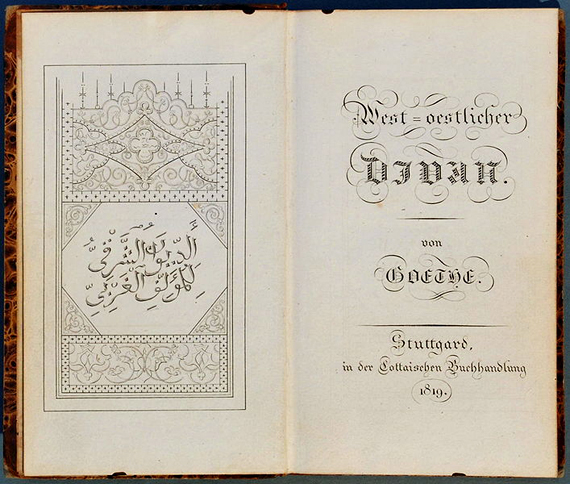
Johann Wolfgang Goethe: West-Eastern Divan. front page and frontispiece (copperplate engraving) of the first edition
Photographs: H.-P.Haack (source: German wikipedia)
Abed Azrié sets into music poems from the Divan of Hafiz and The West-Eastern Divan of Goethe, sung alternately in Arabic and German.
As both poets and both languages require a different musical arrangement, Abed Azrié has first and foremost listened to the selected poems again and again to feel their genuine rhythms, colors and sounds. For the first time he opens his music to the musical arrangement of Gustavo Beytelmann with an Ensemble of Argentine tango instruments.
Let us be carried away by this new composition of Abed Azrié into a diverse confluence of cultures: from the Orient oft the 14th century through Germany of the 19th century into France oft he 21st century with tango rhythms of Argentina.
Hafiz of Shiraz — poet (born around 1315 and died around 1390)
About the life of Hafiz, poet, philosopher and mystic, almost nothing is known. Apart from his collection of poems of the Divan and his much loved city of Shiraz, where he was born and where he died, little has been handed down.
In the century in which Dante writes his Divine Comedy and Petrarch his Canzoniere, Hafiz is writing his ghazels, carnal or mystical love poems, which are detached from the reality of the moment in order to sublimate it.
A ghazal is like a cup of wine that intoxicates, a drink of life, of love, of insight into the mystery of the world.
For Hafiz, man’s meaning of life lies in his predestination to love. Love has released Hafiz’ tongue, and his Divan is the visible jewel that he carries in his heart. Hafiz often chooses images, metaphors and allusions for his poetic expression.
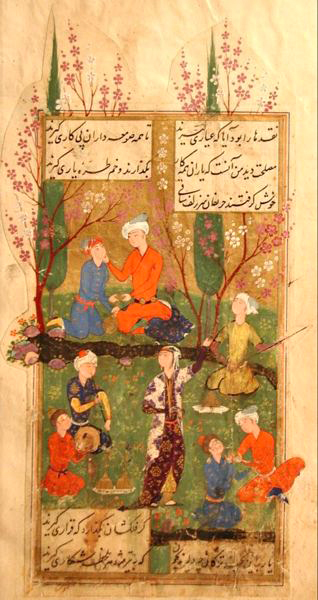
Divan of Hafis, miniature painting, Persia, 1585
(source: German wikipedia)
The tavern for him means a theater of life, which offers deeper and richer experiences than those that are possible in solitary meditation, reading sacred books, or in the acceptance of dogmas. This gives his voice a human presence, we feel close to. Love develops its comprehensive vision in the form that historical events seem to be dissolved in the timelessness of love. The absolute figure of his poems is the Beloved.
Hafiz concealed a poetic mystery that remained his secret. His poems reflect the invasions and wars as well as the spirituality of his time. And if Hafiz enjoyed an undisputed popularity, perhaps because love occupies such a prominent place in his work that it transcends the boundaries between the human and the divine.
For Hafiz, the ascetic has less wisdom than the drunken, the austere less greatness than the libertine.
The poetry of Hafiz is often sung in the traditional Iranian music. His collection of poems of the Divan is also used as an instrument for popular fortune telling, for questioning the future. To this day, the Iranians are still asking questions concerning their future to Hafiz, and then open the Divan at random. The poem on the open page can then be interpreted as an answer to his question.
Hafiz, who is revered in Iran, has had a major impact on Persian poets and has greatly influenced great writers like Victor Hugo and particularly Goethe. Goethe found in him his poetic role model and his master. The mausoleum of Hafez in Shiraz has become a place of worship and pilgrimage.
Johann Wolfgang von Goethe’s West - Eastern Divan (1749-1832)
Johann Wolfgang von Goethe was a German poet, novelist and playwright, librettist, art theorist and statesman who was greatly interested in science, biology and botany, optics, and geology. Educated as a free spirit being brought up in a wealthy and cultured Protestant middle-class home, he has been equally engaged with the classical literature as well as the Bible, the ancient myths as well as the German legends. He is the author of a comprehensive, encyclopedic work.
When he discovered the poetry of Hafiz in 1814, at the age of 65 years, this leaves him with a lasting impression. Goethe found in the verses of Hafiz, which he praised as a « miracle of poetic design and stylistic refinement », as a source of inner fulfillment and regeneration which nurtured his own vision of the world.
Goethe praises Hafiz’ poems. Hafiz becomes for him a role model, who he emulates. He called Hafiz “sacred Hafiz” or “divine friend”, “poetic twin” or “spiritual leader”.
The West-Eastern Divan, which is published in 1819, is a tribute to the Persian poet laureate as well as a poetic discourse beyond countries and centuries. Goethe would imitate the Orient by no means. For him it is important to set a dialogue, to promote exchange, an encounter between two worlds.
The anthology contains 12 books, each carrying an Oriental and German title. The eighth book is titled Souleika-Nameh (The book of Suleika). A large part of the book was written during the time of his love for Marianne Willemer.
The West-Eastern Divan has found a wide reception in the West. Some of his poems were set into music by composers such as Franz Schubert, Robert Schumann, Felix Mendelssohn-Bartholdy, Hugo Wolf, Richard Strauss and Schoenberg. The Divan was also one of the sources that nurtured Nietzsche’s interest in Persian culture (Thus Spoke Zarathustra).
Abed Azrié — Music and songs in Arabic
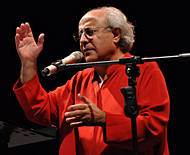
Abed Azrié
Abed Azrié is a French composer of Syrian origin. He has published some twenty music albums, composed music for films and published several books, including his well-known adaptation of the Gilgamesh epic into French. On his tours throughout Europe, the United States and Mexico, he inspires his audiences with the modernity of his compositions and universality of his poetic messages. His music has long enjoyed the admiration of artists as diverse as Yehudi Menuhin, John Adams, Jeff Buckley, Leonard Cohen or René Char.
Abed Azrié sees himself primarily as a man of freedom. He believes in the arts as a medium of humanity and is defending an art that is free from entrenched forms and limitations and is aiming directly at man in his universality and timeliness.
The texts which he selects for his compositions are from oriental and western, ancient and contemporary poetry, and are written in different languages (Arabic, Spanish, French, Venetian, German and English: Adonis, Andrea Zanzotto, Omar Khayyam, Jean Cocteau, Gibran, Hafiz, Goethe. and others.) All these texts have one thing in common: they are evoking the fullness of life and they celebrate the miracle of life, the freedom of the mind and the opening of the heart.
»A word which is sung is no longer just a simple word, but it is enchanted, transformed into trance.«
Abed Azrié dedicates his music to the service of these outstanding poems in world literature. His compositions combine in genuine new ways instruments, rhythms and voices. He creates a distinctive universe of sounds. Emotion and refinement merge in his music, which emanates an extraordinary vitality, nourished by a subtle spirituality beyond all religious dogmas.
From his first album, Le chant nouveau des poètes arabes (1971) up to the latest, Adonis (2011), Abed Azrié is always in search of previously unheard sounds. Suerte (1994), written for three ensembles, an oriental, western and flamenco ensemble, is floating freely between musical notation and improvisation. Omar Khayyam (1998) presents for the first time Arab singing accompanied by a chamber ensemble. Venessia (2000) sets into music the Venetian texts by Andrea Zanzotto in an organic way. With the 'Evangile selon Jean (Gospel of John) (2009), Abed Azrié presents an oratorio for solo voices, mixed chorus and an oriental and western orchestra. Mystic (2007) and L'Épopée de Gilgamesh (Epic of Gilgamesh 1977 and 2010) identifies key stages of his preoccupation with the oldest texts of mankind, which he set to music for singing.
In 1990, he signed his first contract with American Nonesuch/Warner for his album Aromates followed by a contract for three albums with Sony Music in 1995. Harmonia Mundi now distributes his music.
Jan Kobow — songs in German
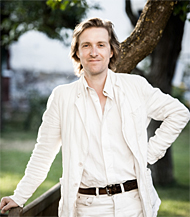
Jan Kobow
Berlin native and tenor Jan Kobow has been a recognized figure in the music world since winning first prize in the 1998 Leipzig Bach Competition. He has established an international reputation as a Baroque vocal musician and has been invited to perform worldwide by among others: Masaaki Suzuki, John Eliot Gardiner, Sigiswald Kuijken, Philippe Herreweghe, Nicolaus Harnoncourt, Gustav Leonhard, Lars Ulrik Mortensen, Frans Brüggen, Jos van Immerseel, and Philippe Pierlot.
Jan Kobow has appeared as a featured soloist on nearly 100 recordings, and has nine solo albums to his credit, including Schubert’s three Lieder song cycles with Kristian Bezuidenhout and Christoph Hammer. He has also recorded Lieder by Mendelssohn, Seckendorff, Johann Krieger, Carl Lowe, John Dowland as well as additional Schubert Lieder with pianists Cord Garben and Ludwig Rémey.
Presently, he is recording the Evangelist roles in the collected Passion Works by Heinrich Schütz with the Dresden Chamber Choir under the direction of Christoph Rodemann, and is participating in a DVD production of Bach’s Christmas Cantata with the Concerto Copenhagen. He has also recorded standard works including: “The Creation”, “The Seasons”, and Bach’s Christmas Oratorio, St. John’s Passion, and B minor Mass.
Jan Kobow has appeared in various Baroque operas around the world including productions at the Theatre de la Monnaie in Brussels and Lincoln Center in New York City. Most recently his portrayal of the title character in Boxberg’s “Sardanapalus” at both the Ekhoff Festival in Gotha, and Frankische Sommer Festival was a great success. Audiences have particularly delighted in his comic turns in the operettas “Die Blaue Mazur” by Franz Léhar and Conradi’s “Ariadne”.
Much sought after as Singer of Lieder, this season Jan Kobow will perform Schubert
Lieder Evenings in Berlin and Ghent accompanied by Jos van Immerseel. He will also
be singing Lieder by Krenek at the Frankische Sommer Festival with pianist
Burkhard Kehring.
He is a founding member of the vocal ensemble “Die Himlische Cantorey” which has
already recorded approximately ten CD’s.
At home in Schloss Seehaus, Jan Kobow hosts an annual concert series, and conducts vocal master classes to share his knowledge and love of music.
Gustavo Beytelmann — Arrangement & Piano
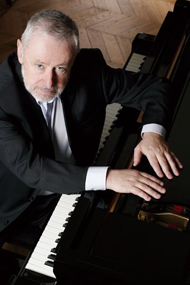
Gustavo Beytelmann
Born in Buenos Aires the pianist and composer Gustavo Beytelmann has developed a musical language which is entirely his own, based on the tango of his native country. He enriched his music style with is growing experiences of extensive travelling and his life experience. 1962, he studied piano, harmony and composition in Buenos Aires. He wrote film scores, works for the record industry as a pianist and composer, and has played in various jazz ensembles.
In 1976 he moved to Paris. In 1977, Astor Piazzolla invited him to join his European tour, which begins at the Olympia in Paris. Shortly thereafter he founded, the group «Tiempo Argentino" with other musicians, which is an important stage in his development as a composer. After that, he went to Rome, where he writes compositions for the Italian radio, television and the cinema. On his return to Paris he founded a trio with Juan José Mosalini and Patrice Caratini that is performing during more than 12 years throughout Europe and America. The ensemble recorded three albums that represent an important contribution to the development of the tango. Gustavo Beytelmann is simultaneously writing music for the French and German cinema.
From 1993 onwards he is invited to numerous artist-residencies in Dijon (1995-1998) and in Guebwiller (2002-2003). His music is being played all over Europe. Since 1996 he has been artistic director of the Department of Tango at the Conservatory of Rotterdam. 2002, he is invited by the University in Seattle and Bellington (USA) to teach master classes on his music. 2004 follows an invitation from the Tango Festival in Buenos Aires, where he plays a piano solo at the Colón Theatre. Since 2005/2006 he regularly teaches master classes at the Music Academy in Monaco. In August of the same year, he is invited to an artist-residence in Moritzburg (Germany).
After years of playing together with protagonists of Argentine music, Gustavo Beytelmann allows himself a respite as soloist. He lays aside momentarily his career as a composer of film music, compositions for Trio, Quartet or Symphony orchestra and focuses on assorting the classical tango repertoire again. Listening to him, you can sense his intense pleasure to evoke in his audience the tenderness, which is hidden in the tango rhythms. This can be felt mainly in the moment between the music and the silence. The tempo changes are better noticeable in a new dimension of listening, when only one instrument is playing. The tango, which was originally dedicated to dancing, becomes a music to listen to.
© 2012